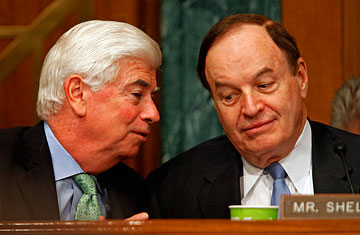
Senate Banking, Housing and Urban Affairs Committee Chairman Chris Dodd, left, talks with Senator Richard Shelby while hearing testimony from Federal Reserve Chairman Ben Bernanke on July 22 in Washington
If you were to pick the least likely Senator to help Barack Obama win a major legislative victory, Alabama's Richard Shelby, the ranking Republican on the Senate Banking Committee, would be a fine choice. Once a "boll weevil" Democratic opponent of Bill Clinton, Shelby became a Republican in November 1994, helping the GOP cement its hold on the Senate at a crucial moment. He has had a near perfect record of conservatism on social and foreign-policy issues since then. The tall, drawling former prosecutor questioned Obama's citizenship this past February, and when Treasury Secretary Tim Geithner first unveiled the Administration's sweeping plan to reform the financial system in June, Shelby said of its goal to expand the Federal Reserve's regulatory power, "I personally believe this represents a grossly inflated view of the Fed's expertise."
But necessity can make history obsolete. As proof, the Obama Administration has launched a full-court press to win Shelby's support for its financial-reform proposals, which the President will push Sept. 14 in a noon speech at Federal Hall on New York City's Wall Street. "We are in almost daily contact with [Shelby's] staff and have been going over the proposal with them literally line by line," says a senior Treasury department official. Shelby and the Senate Banking chair, Democrat Chris Dodd, have also been working together closely. "[Shelby's] folks are deeply engaged and we share the view that he wants to get something done," says the senior Treasury official.
Dodd and Shelby have proven to be a potent bipartisan combination already in 2009. When Dodd moved an aggressive, populist credit-card-reform bill out of committee without a single GOP vote, he negotiated with Shelby to craft legislation more appealing to the other side of the aisle. It passed the Senate in late March by a 90-5 vote.
But even if comity rules, there are plenty of hurdles preventing Shelby, Dodd and the Treasury from coming together on a consensus bill. Dodd, facing a tough re-election battle in Connecticut, needs to please his base with a left-leaning bill, while staffers say Shelby has issues with the shape of the bill so far. The Senator doesn't like the Administration's proposed Consumer Financial Protection Agency, though he's willing to support enhanced protections of some sort. But he is firmly against an Administration proposal to let the Federal Reserve designate which financial institutions qualify as most important to the stability of the system.
Still, Shelby has his reasons for wanting a bill to fix the financial sector, and they start with pride. "At 75 years old this is probably the last major thing he'll participate in," says one senior GOP Senate staffer. Democrats in the Administration and on Capitol Hill say they believe Shelby is negotiating in good faith.
The Democratic outreach to Shelby could signal a repeat of their credit-card-bill strategy. Some observers see Dodd and the Administration working to craft a bill close enough to Shelby's liking so that even if it gets rammed through the committee with Democratic base-pleasing measures he won't vote for, the bill can be reworked to gain his support on the Senate floor. That would give Dodd the political cover he needs for his 2010 re-election campaign, but would also give the Administration the Republican support they need for a solid legislative win. And it would give Shelby his landmark piece of legislation.
Threading that political needle — while trying to stitch together a complex reform bill on which the stability of the entire financial system depends — is a long shot. But at least everyone involved has a reason to make the bet.
